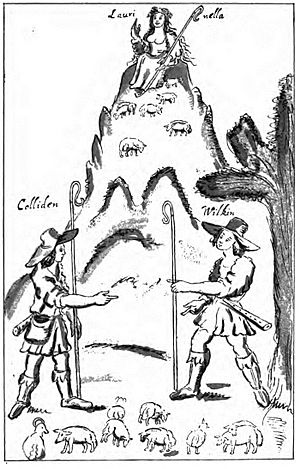William Basse facts for kids
William Basse (born around 1583, died around 1653) was an English poet. He was a follower of another famous poet, Edmund Spenser. Today, Basse is mostly remembered for a special poem he wrote about William Shakespeare after Shakespeare died. He is also known for his "Angler's song". This song was written for Izaak Walton, who included it in his famous book, The Compleat Angler.
Contents
Who Was William Basse?
We don't know much about where William Basse was born or his family. In 1638, a historian named Anthony à Wood said Basse was "of Moreton, near Thame, in Oxfordshire". He also mentioned that Basse used to work for the Lord Wenman at Thame Park. This means he was part of their household, perhaps helping with various tasks.
Some people think Basse might have come to Thame from Northamptonshire. He might have been a page (a young servant) to Agnes Fermor. She was the first wife of Lord Wenman. Basse's poems also mention Francis Norris, 1st Earl of Berkshire. This suggests Basse might have worked for him at Rycote, Oxfordshire, too.
Basse dedicated one of his poetry collections, Polyhymnia, to Bridget, Countess of Lindsey. The first poem in this book was for her grandfather, Francis Norris. In this poem, Basse wrote about how he wasn't born to be showy or use fancy words. He said his simple poetry was there to serve his noble patron.
Basse's Education and Career
William Basse went to Lord Williams's School.
For a long time, people wondered if there were two poets named William Basse. This was because his first poem was published in 1602, and his last one in 1653. That's a 51-year gap! However, looking closely at his poems, it seems they were all written by the same person. One of his friends, Ralph Bathurst, even wrote that Basse was like an "aged oak" and that his "grey muse" (meaning his older poetry) grew up with earlier times. This suggests he had a long career.
Basse received support from the Wenman family of Thame, Oxfordshire. He also had connections to the Tasburgh family. His early work, Three Pastoral Elegies, was dedicated to Jane Lady Tasburgh. She was connected to both the Wenman and Tasburgh families.
There was a student named William Basse from Suffolk who went to Emmanuel College, Cambridge, in 1629. But it's very unlikely this was the poet. The poet's works were published in Oxford, and he had strong ties to important families in Oxfordshire. This makes it more likely he was from Oxfordshire, not Suffolk.
William Basse's Poems
|
On Shakespeare Renowned Spenser, lie a thought more nigh |
In 1602, two of William Basse's poems were published. One was called "Sword and Buckler, or Serving Man's Defence". The other was "Three Pastoral Elegies of Anander, Anetor, and Muridella". "Sword and Buckler" was his first published work.
In 1613, he published an elegy (a sad poem for someone who has died) about Henry Frederick, Prince of Wales. It was called "Great Brittaines Sunnes-set". Basse dedicated this poem to his "honourable master, Sir Richard Wenman".
No other books of Basse's poems were printed while he was alive. However, he prepared two collections of his poems for printing. These are still around today as manuscripts (handwritten copies). One collection is called Polyhymnia. The other collection has three long pastoral poems. One of these is dated 1653 and was dedicated to Sir Richard Wenman.
Basse's Famous Poem About Shakespeare
Basse's most famous poem is a sixteen-line elegy about William Shakespeare. This poem was very popular!
It was written between 1616, when Shakespeare died, and 1623. In 1623, another famous writer, Ben Jonson, wrote his own tribute to Shakespeare. Jonson's poem was a response to Basse's. Many handwritten copies of Basse's poem exist from the 1600s. Ten of them say Basse wrote it. One copy is even in the handwriting of Basse's friend, William Browne.
The poem first appeared in print in 1633 in a collection of John Donne's poems. It was later printed in a 1640 edition of Shakespeare's poems. Here, it was correctly credited to 'W. B.' and titled 'On the Death of William Shakespeare'.
Other Works and Songs
Basse also wrote a poem praising Michael Baret's book, Hipponomie, or the Vineyard of Horsemanship (1618). He might also be the 'W. B.' who wrote verses for Phillip Massinger's play, Bondman (1624).
In Izaak Walton's Compleat Angler, a character named Piscator (who represents Walton) says he will sing a song. He says it was "lately made at my request by Mr. William Basse". Piscator also mentions that Basse wrote other well-known songs like "The Hunter in his Career" and "Tom of Bedlam". Basse's "Angler's Song" then follows, starting with "As inward love breeds outward talk".
The song "Maister Basse, his careere, or the new hunting" was printed in 1620. The tune for it is found in an old music book. Basse also contributed a poem to a book called 'Annalia Dubrensia' in 1636.
Published Works
- Great Brittaines Sunnes-set, bewailed with a shower of tears (1613)
- Maister Basse his Careere, or The new Hunting of the Hare To a new Court tune (1620)
- The Pastorals and other Workes of W. B., Never before imprinted (Oxford, 1653)
- The Poetical Works of William Basse (1893), edited by R. Warwick Bond
 | Emma Amos |
 | Edward Mitchell Bannister |
 | Larry D. Alexander |
 | Ernie Barnes |


